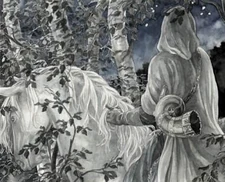Oromë (Quenya; IPA: [ˈorome] - "Horn-Blower" or "Sound of Horns"), also known as Aldaron (Quenya; IPA: "Horn-Blower"), Araw (Sindarin; IPA: "Horn-Blower") or Arômêz, was an Ainu, one of the Aratar and a Vala who was responsible for the hunt. He was the brother of Nessa and the husband of Vána.[3]
Biography

Oromë in Middle-earth
During the Years of the Trees, after most of the Valar had withdrawn completely from Middle-earth and hidden themselves in Aman, Oromë still hunted in the forests of Middle-earth on occasion. Thus, he was responsible for discovering the elves when they awoke at Cuivienen, and the first to name them the Eldar[4], following this he remained close in friendship with the Eldar.
Being a powerful huntsman, he was active in the struggles against Morgoth. He had a great horn called the Valaróma and a great steed named Nahar.[3] Huan, a Hound from Valinor, once belonged to him and was later given to Celegorm, one of the Sons of Fëanor.[5]
Etymology
Oromë means "Horn-blowing" and "Sound of Horns"[6], and is derived from the Valarin name Arômêz.[7]
Araw is the Sindarin translation of Oromë.[7] The Sindar additionally referred to him as Tauron, which means "Lord of the Forests" and "The Forester."[6] It is possible that the name comes from the Sindarin taur ("forest") or the Quenyan taure ("great wood").[8]
Other names
In the Old English translation of Eriol, Oromë is called Wadfrea ("The Huntinglord"), Huntena frea ("Lord of Hunters"), and Wealdafrea ("Lord of Forests").[9] Among the Rohirrim and other Northmen, he was also sometimes called Béma (Old English, originally Béaming; translating Tauron "forest-lord")[10].
Character
Oromë is described to be a mighty lord and a great huntsman, as he would often train his folk and beasts in pursue of evil creatures. He loved the lands of Middle-earth that he was initially unwilling to leave it. He contrasts the Vala Tulkas in demeanor; whereas Tulkas laughs in sports, Oromë is said to be dreadful in anger.[3]
Maiar of Oromë
- Alatar and Pallando, the last two of the five wizards, were Maiar sent by Oromë to Middle-earth. What became of them is not known, although apparently they journeyed into the east with Saruman, but did not return.
Earlier versions of the legendarium
Oromë and his wife Vána were once envisioned to have had a daughter named Nielíqui.[11]
Translations around the World
| Foreign Language | Translated name |
|---|---|
| Amharic | ዖሮሜ |
| Arabic | أوروم |
| Armenian | Էրոմե ? |
| Belarusian Cyrillic | Оромё |
| Bengali | ওরমে |
| Bulgarian Cyrillic | Ороме |
| Burmese | ဪရောမေ ? |
| Cambodian | ោរោមេ ? |
| Chinese (Hong Kong) | 歐羅米 |
| Dari | ورومه |
| Georgian | ორომე |
| Greek | Όρομε |
| Gujarati | ઑરોમે |
| Hebrew | אורומה |
| Hindi | ॐरोमे |
| Japanese | オロメ |
| Kannada | ಓರೊಮೆ |
| Kazakh Cyrillic | Ороме |
| Korean | 오로메 |
| Kurdish | ۆرۆمه (Arabic script) Orome (Latin) |
| Kyrgyz Cyrillic | Оромэ |
| Macedonian Cyrillic | Ороме |
| Marathi | ओरोमे |
| Mongolian Cyrillic | Оромё |
| Nepalese | ॐरोमे |
| Persian | اورومه |
| Punjabi | ਓਰੋਮੇ |
| Russian | Оромэ |
| Sanskrit | ॐरोमे |
| Serbian (Cyrillic) Orome (Latin) | Ороме |
| Sinhalese | ඕරොමෙ |
| Tajik Cyrillic | Ороме |
| Tamil | ஓரொமெ |
| Telugu | ఓరొమె |
| Thai | โอโรเม |
| Ukrainian Cyrillic | Ороме |
| Urdu | ورومے |
| Uyghur | ورومە |
| Uzbek | Ороме (Cyrillic) Orome (Latin) |
| Yiddish | אָראָמע |
References
- ↑ The Complete Guide to Middle-earth
- ↑ The Silmarillion, Quenta Silmarillion, Chapter I: "Of the Beginning of Days"
- ↑ 3.0 3.1 3.2 The Silmarillion, Valaquenta, "Of the Valar"
- ↑ The Silmarillion, Quenta Silmarillion, Chapter III: "Of the Coming of the Elves and the Captivity of Melkor"
- ↑ The Silmarillion, Quenta Silmarillion, Chapter XIX: "Of Beren and Lúthien"
- ↑ 6.0 6.1 The Silmarillion, Index of Names
- ↑ 7.0 7.1 The History of Middle-earth, Vol. 11: The War of the Jewels, Part Four: Quendi and Eldar, Appendix D: Kwen, Quenya, and the Elvish (especially Ñoldorin) words for 'Language
- ↑ The History of Middle-earth, Vol. 5: The Lost Road and Other Writings, Part Three: "The Etymologies"
- ↑ The History of Middle-earth, Vol. 4: The Shaping of Middle-earth, III: "The Quenta", Appendix 1: Translation of Quenta Noldorinwa into Old English
- ↑ http://glyphweb.com/arda/b/bema.html
- ↑ The History of Middle-earth, Vol. 1: The Book of Lost Tales Part One, III: "The Coming of the Valar and the Building of Valinor", Notes and Commentary
